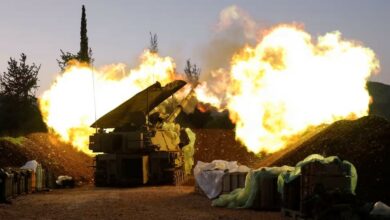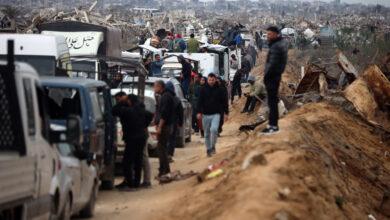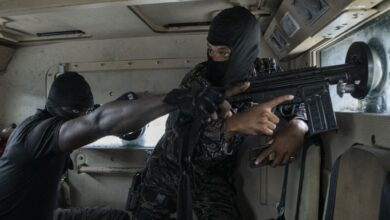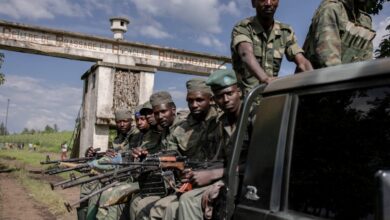
By Erin A. Neale
Atlantic Council
Libya’s stability is consequential to the security of Northern Africa and Europe. Foreign actors have interests and political stake in Libya and are therefore investing in the ongoing, high-level political negotiations. The international community’s narrow focus on political harmony will have huge costs for the future of Libya and the region.
The United Nations strives for a political deal between the rival governments and such an agreement would be an improvement. However, not only have political negotiations stalled, but the breakdown of the security in the meantime will make any political deal futile. While the political talks are in limbo, militias on the ground are spoiling any prospects for an organized state.
The longer this status-quo persists, the harder it will be to uproot it; now is a valuable time to tackle Libya’s militia problem before it aggravates the entire region. The United States, Russia, Egypt, France, Italy, the Gulf and others putting effort and resources into solving the crisis should foresee the investments in disarmament, demobilization, and reintegration of militiamen into whatever security institution the future Libyan state will have.
The severe breakdown of security is a consequence of the collapse of the Libyan identity and state institutions following the 2011 Arab Spring. The western region in particular has devolved into a nexus of criminal activity and militia networks, where the line between the two continues to blurr. The power of the Government of National Accord – based in Libya’s western capital of Tripoli and backed by the U.N. – has faded since its installment in early 2016. The coalition of forces nominally aligned with the GNA prefer to pursue their own economic interests and operate freely. The GNA does not have a monopoly of force in the west; in fact, it controls very little.

The lack of intimidation by the government was made clear in several recent disturbing incidents. In December, a group kidnapped and assassinated the mayor of Misrata, Libya’s third largest city. In March, another group attacked a high-ranking government official near Tripoli. Only a few weeks ago, an unknown group kidnapped the mayor of Tripoli, Abdelraouf Beitelmal. Thankfully, he was released the day after unharmed.
Libyan militias’ shifting loyalties
The U.N. has publicized the political negotiations and put all its eggs in this basket. The U.N. Special Envoy to Libya Ghassan Salame came out with an ambitious Action Plan for Libya in September 2017 to solve the crisis in the country. The political component of this Action Plan is indeed essential and must continue or else there will be a damaging outcome.
Nevertheless, a political solution at the top alone means little to Libyans whose everyday lives will not necessarily be more secure after political recondition. In the current environment, any government would not wield power over the men on the ground who have weapons.
Attacks on high-ranking officials demonstrate the weakness of the Libyan state and the reality on the ground today in the west and south. Militias police their respective neighborhoods and are accountable to no one. Groups jockey for control of lucrative infrastructure and critical entities, such as prisons, which causes frequent violence. Some militias make more money by engaging in human, oil and drug smuggling than they would from the GNA. Therefore, groups – especially in the coastal cities west of Tripoli – raise revenues independently and are not responsible to the U.N.-backed government.
Evidence that the militias are voluntarily financing themselves and pursuing their immediate interests lies in the loyalty shifts that occur frequently. In October, a group of militias formed an unexpected coalition to rid a Tripoli suburb of fighters loyal to Saif al Islam, the son of Libya’s former dictator overthrown in the Arab Spring, Muammar Qaddafi.

Corruption is suspected to be the main motivator for many changing alliances. For example, in September, the Tripoli Security Directorate originally took a hostile position against the protests organized by Basit Igtet, another candidate who strives for Libya’s highest office, by banning the protests. The day before the September 25 demonstrations, the TSD suddenly changed its stance. This change of position has been rumored by many to be due to a large sum of cash being paid to the leader of the militia. Exploiting rivalries and situations such as the protests in December exemplify the volatility of alliances and positions in today’s Libya.
In the south, clashes have caused the displacement of 4,500 residents and several dozen deaths. These clashes are the result of tribal tensions as well as competition over the migration economy. No overarching government power has the authority to stop the fighting. In fact, each rival government is likely supporting a side for their own political gain later down the road.
Reconciliation woes
The U.N. plan includes amending the 2015 Libyan Political Agreement, creating a National Conference for dialogue and reconciliation, and, after all of that, holding presidential and legislative elections. The thorny issue of what to do with the various militias has not been dealt with except for part of the plan which will host militia leaders at the National Conference.
The difficulties surrounding a National Conference are many. Disagreements on who to include and exclude from participation are hard to work out, and Salame has once again changed his plan by redefining the National Conference. Instead of holding a meeting at one place at the same time for the main actors in today’s political and military environment, he has planned a fluid series of meetings that he takes in various cities and locations all over Libya.
The country and the region would see a brighter future if a comprehensive reconciliation conference takes place. Unfortunately, the U.N. is jaded, and a good number of Libyans on the ground prefer to spoil the process than participate. In fact, some actors do not want a security or political reconciliation blocking their illicit profits that flow nicely in the current state of chaos. While some could be persuaded using a “stick and carrot” approach to participate in the Conference and reintegrate into the future state structures, others will not be convinced and remain hostile to the whole process. Therefore, the only component of the U.N. Action Plan that includes security entities on the ground is, at best, not entirely inclusive and, at worst, non-existent.
An effort parallel to the ongoing political negotiations needs to be made to disarm, dissolve, and unite militias. The U.N. should invest in a much larger reconciliation effort between militias in Libya, and now is the time to do it.
A derivative of consequences
Until and through now, Egypt has been the only outside actor spearheading an effort to unite security forces in Libya. Last month, various military factions met in Cairo to discuss creating a united armed force.
Five other meetings of this kind took place before, however the most recent meeting presented some positive changes. First, the meeting was not as favorable to General Khalifa Haftar, the Libyan strongman who controls half of the country and whom Egypt supports militarily despite criticism from the West. Additionally, Western powers for the first time publicly praised the meetings. The United States and France released statements praising the efforts in Cairo. This sudden support from the West shows these meetings are hosting legitimate military actors and can add momentum to completing the reconciliation.

The level of violence in Libya today is relatively low compared to other periods post-2011. Therefore, militia leaders will be more likely to come to the negotiating table because they do not have a conflict that may bias their decision making. Additionally, the malleability of militia loyalty is a double-edged sword. Although switching alliances makes the situation on the ground infinitely complex and volatile, the fact that militias are changing their minds can be capitalized as an asset if done correctly. A combination of the stick and carrot methods is most likely to win the cooperation of militia leaders.
Time is also on the side of uniting security forces in Libya. The political reconciliation process is constantly stalled by members of both rival governments who either do not want to give up on their interests, which includes their paychecks. The time hanging between the on-again-off-again negotiations and frequent gridlock should be utilized for vetting militias and building structures for the security apparatus to absorb them.
Libya’s militia problem has a derivative of consequences. Not only will militias continue to fight with each other, but fractured regions are havens for terrorism. Most telling is Islamic State and al-Qaeda who are entrenching their influence along the central seams of Libya’s multiple internal conflicts.
Foreign actors individually wield more influence in the conflict than any single Libyan actor and therefore all have the country’s fate in hand. Nevertheless, outside actors are ignoring a key component to engagement in the country: not tackling the militia problem while we still can.
The international community should pressure the U.N. to prioritize the security initiative at the same level as the political component of the Action Plan for Libya.
Vetting militias now is the only way for political actors in Libya to negotiate with and integrate armed men into a unified security apparatus once national actors reach a political deal. Building up the GNA with more resources and training will help its influence in Libya and ability to absorb willing militias. The international community can also starve militias by cracking down on the illicit economy, such as oil smuggling to Tunisia and Italy. Unfortunately, most European and North African countries are distracted by their respective domestic politics and will extend the acute mistake of inaction in Libya.
 Erin A. Neale is a research assistant at the Atlantic Council’s Rafik Hariri Center for the Middle East where she focuses on North Africa. Follow her on Twitter: @erinaneale.
Erin A. Neale is a research assistant at the Atlantic Council’s Rafik Hariri Center for the Middle East where she focuses on North Africa. Follow her on Twitter: @erinaneale.
All views and opinions expressed in this article are those of the author, and do not necessarily reflect the opinions or positions of The Defense Post.
The Defense Post aims to publish a wide range of high-quality opinion and analysis from a diverse array of people – do you want to send us yours? Click here to submit an Op-Ed.











